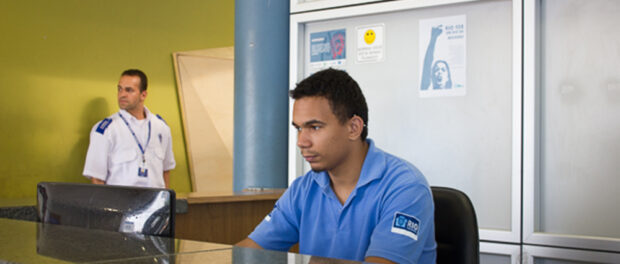
Many projects were promised when the City and State of Rio de Janeiro turned their attention to social program planning in Complexo da Maré. The authorities began to consider investing in social programs within the pacified communities when they identified the incapacity of guaranteeing quality of life improvements strictly by militarizing the favelas, despite spending nearly R$2 million (US$639,019) per day to install the Pacifying Police Unit (UPP) in Maré. Issues such as basic sanitation, health, mobility, and early and digital education were allocated funding, in a community that represents one of the lowest Human Development Index (IDH) rankings in the city.
Residents of Rua Bento Ribeiro Dantas, one of Maré’s 16 favelas, located near the Yellow Highway (Linha Amarela), are awaiting the installation of a Nave do Conhecimento (Ship of Knowledge community learning center), due to be installed in December 2014 by Rio’s City Hall. Five other favelas have already benefited from the program elsewhere in the city, including Complexo do Alemão, also located in the North Zone.
The Nave do Conhecimento offers courses on culture, technology, and information technology. According to the site, all of the courses focus on residents’ every-day reality, critical thinking and actions, and the promotion and appreciation of the human being and the urban territory of favela communities.
Gabriel Loiola, 21, is a resident and receptionist at the Nave in Nova Brasília. He states that the knowledge acquired through the courses creates opportunities for professionalization and, especially, knowledge for daily life in the favela. “The photography course is very much sought after by young kids. And with this, they don’t just learn technical knowledge. In the end, to know how to photograph is important because it allows us to document our history”, affirmed Gabriel.
The Maré Linear Park, where the new technology institute will be built, is known by its residents as Ciclovia do Pinheiro (Pinheiro Bike Path). In addition to space to ride one’s bike, there is a soccer field and a playground. Residents use that space night and day and there is no sign stating that the area will be remodeled. Local businesses also did not know of the news. “What I know is that there will be an amusement park at the weekend. It will be here for a month,” a resident said. Cyclist Viviane Oliveira, 32, uses the bike path at her daughter’s request. “It is an important space for leisure, but the authorities and even other residents don’t respect it. I have grown tired of using it and seeing residents drive through on their motorcycles. I won’t even mention the broken toys and the parking lot. There are already few spaces of leisure and they are becoming more sparse.” Part of the bike path is being used for the construction of a second Family Clinic, estimated to be finished in December of this year. Vila do Pinheiro has 2,300 homes and approximately 16,000 residents.
The integration of educational programs was thought of in order to combat the inequality of digital literacy. All of the programs offered are free and open to all ages. They promote access to leisure, training, art and new digital media. According to data from the 2010 Census, the level of illiteracy in Maré between 10-14 year-old children and teens is close to 5%, significantly higher than the rest of the municipality. Resident Lídia Féliz, 24, believes many of the promises are linked to the idea of “rescuing local citizenship,” borrowed from the commercial media discourse regarding the community after the armed forces entered the favela. She adds, “Since they made promises, they have to follow through. We as residents must demand this. I don’t only think of my niece, but of all the children that live in Maré.”
Another initiative implemented to help spread technological education among children, teens, and adults is the project Casa Rio Digital (Rio Digital House), located on the main road in the community. Within the project, certain concepts such as democratization, integration, diversity, and network-based work are developed. However, publicity for the project does not reach the majority of the population.
While residents await the realization of these promises, City Hall believes people will forget them. Leonardo Nóbrega, 20, resident of Parque União, does not frequent the space but thinks the delays have been dishonest, “This happens because they do not have any real intention to serve the community. Since they have the power, they do as they want. Living in a war zone, how can residents feel they have a right to demand these services?” he questions.
The Special Secretariat for Science and Technology (SECT) and the Municipal Housing Secretariat (SMH) responsible for the construction of the Nave do Conhecimento in Maré, were sought for comments, but hadn’t responded at the time of publication.
*Thaís Cavalcante is a 21-year-old community journalist, born and raised in Nova Holanda, one of the favelas in Complexo da Maré. Working as a community reporter over the past 4 years in her community, Thaís decided to study journalism at university and believes in the power of information to change our reality.

